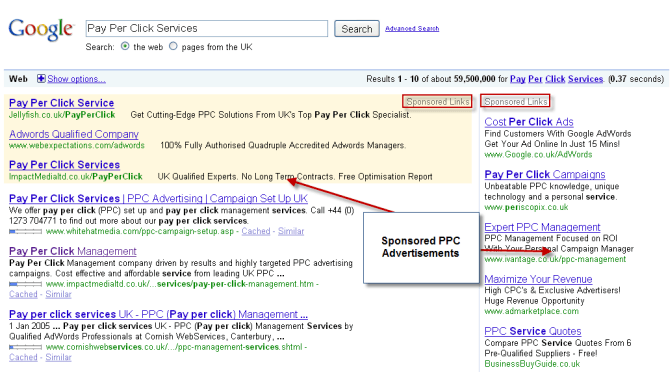What is PPC Advertising?
PPC is an acronym for Pay Per Click. It is the most prevalent and popular form of advertising on the Internet and works by charging a pre-determined amount each time an advert is followed by a visitor.
Sponsored adverts appear with the vast majority of search engine results pages (SERPs). They can often be seen in a coloured box at the head of the main search results as well in a column running adjacently to the right.

PPC advertising is very much a unique concept when it comes to marketing products and services. Offline, the results of a campaign are often difficult to gauge, with market research and sales performance analysis required to estimate performance levels. With PPC, data is continuously being generated. When coupled with a programme such as Google AdWords, you don’t just accumulate expense, the adverts generate user information; this includes what they searched for, where they navigated to and how they left the site.
These statistical snippets come together to create a viable measurement of success, whilst also constructing behavioural patterns that can help you to alter your ads, the landing page or the website itself. You can bid for certain terms too, allowing greater flexibility when it comes to budgeting. The more competitive the key phrase your targeting is, the higher you’ll need to bid to secure a top position.
The search engines measure how many people see your advert and compare it to those who actually click on it. This is then given as a percentage and called your Click through Rate. Perceived wisdom suggests that the more people who click on your advert, the more relevant they find it. This in turn leads the search engine to give it greater weighting, which ultimately allows advertisers to lower their bids and still achieve the same high ranking. Google, Yahoo and Bing are looking for the best quality adverts, not necessarily those who will pay most.
Statistics are available for analysis almost instantaneously. This means that you can pinpoint any issues early on, helping prevent any seepage of your budget. There are no upfront costs and you can even choose to show adverts at certain times of the day; Google AdWords, for example, now allows you to define visibility parameters to within 15 minutes. [See – Google AdWords Ad Scheduling Updated and Refined] The more unnecessary impressions you can avoid, the better your CTR. The better your CTR, the more money you can save. [See – What is a Click through Rate (CTR) and why is it Important?]
Effective management is key to any PPC campaign’s success. By refining each advertisement, including specific scheduling and the removal of negative keywords, you can help to target your key demographic audience. This will help the cost efficiency of your marketing, whilst also ensuring your website gets greater exposure online.
Leave a Reply